Formentera - A Naturist Island Paradise!
by Formenteralover
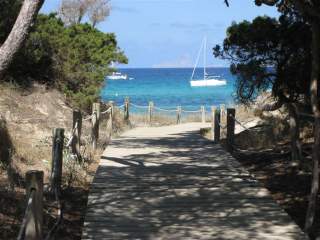
Why come to Formentera?
Do you dream of walking naked along white fine sandy beaches and bathing in warm clear turquoise waters, yet do not fancy hunting out remote tropical islands in either the Pacific or the Caribbean?
Formentera is the smallest and most southerly of the Spanish Balearic Islands. It lies south of Ibiza and offers a complete contrast to that renowned decadent party island. For those seeking an escape from the heady pace of modern life, then you need look no further. In a world of cheap airline travel and instantly accessible holiday locations, it is becoming increasingly difficult to find somewhere to go that has not already suffered from the impact of mass travel. The island’s secret weapon, against this tourist onslaught, is its lack of an airport. Access to the island is provided by fast ferries from Ibiza, a ten minute taxi drive (€20) from the airport. A much cheaper alternative is the island bus (€3).
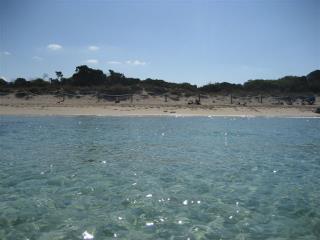
Much of the island has been designated as a National Park and both the National and Regional governments are protecting Formentera, especially with dune protection, and building work is strictly controlled and only allowed in areas of permitted development. The island is constantly trying to establish its eco-friendly credentials. This unfortunately, means that camping is prohibited.Accommodation is mainly provided by both rented houses and hostals (family-run independent businesses),though there are two big Spanish hotel complexes on the Migjorn beach. As a result, in both late July and August, the island gets fully booked and it is not recommended to arrive on the island without accommodation already booked.Addressing the islands few negatives, while electric bikes are a growing trend, too many cars still clog up the few roads during the height of the summer. July and August see a flood of young Italians on the island with their more conservative approach to bathing. (Though, if you are a follower of fashion, there is nowhere better.) This alters the dynamics of the island, making naturism less visible. Also, it introduces the potential hazard of large numbers of scooters and mopeds driven by excitable young people. However, June, early July and September are the months to stay, where you can enjoy all of its qualities without the crowds, where you will discover that naturism is widely practised.
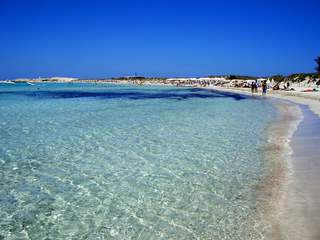 Formentera is principally a beach holiday. There are few cultural or historical attractions to see. If you are seeking a holiday with arranged events, kids clubs, a lively club scene, then Formentera is not for you. Its appeal lies in escaping the heady pace of the modern world. It is a place to step back, chill out and generally take it easy. This draws on the island’s hippy past and its association with Pink Floyd, King Crimson and Bob Dylan who is alleged to have lived for six months in an abandoned mill near La Mola. You will be doing this in serene surroundings of sparkling clear waters and fine sandy beaches all under azure blue skies. La Savina, the island’s port, and your point of entry, is a constant hive of activity as the island attracts a large number of sailors, including a dazzling display of SuperYachts. The only designated tourist centre is based around Es Pujols, a town dominated by the Italians in the summer. It sits on the only beach where naturism is not allowed.
Formentera is principally a beach holiday. There are few cultural or historical attractions to see. If you are seeking a holiday with arranged events, kids clubs, a lively club scene, then Formentera is not for you. Its appeal lies in escaping the heady pace of the modern world. It is a place to step back, chill out and generally take it easy. This draws on the island’s hippy past and its association with Pink Floyd, King Crimson and Bob Dylan who is alleged to have lived for six months in an abandoned mill near La Mola. You will be doing this in serene surroundings of sparkling clear waters and fine sandy beaches all under azure blue skies. La Savina, the island’s port, and your point of entry, is a constant hive of activity as the island attracts a large number of sailors, including a dazzling display of SuperYachts. The only designated tourist centre is based around Es Pujols, a town dominated by the Italians in the summer. It sits on the only beach where naturism is not allowed. The island beaches are its jewels. They are enhanced by the close proximity to each other, especially if windy conditions make one beach unsuitable. A quick walk can resolve on-shore breezes and restore calm waters for bathing. Hopefully, the accompanying photos provide sufficient evidence of the island’s allure.
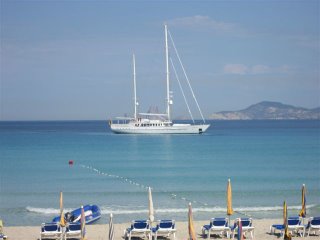
The most famous beach is Platja de ses Illetes, on the north western coast. It is considered one of the most beautiful in the Med, if not the world. However, this fame attracts the day trippers from Ibiza and the Super Yachts. It can become very packed and in the peak season becomes predominately a clothed beach. Its restaurants reflect its customers and are not cheap.
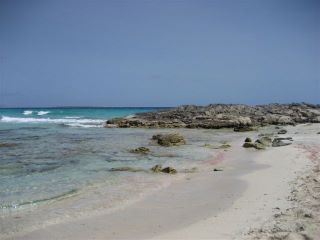 Luckily, a short stroll to the other side of the island brings you to the official naturist beach, Platja de Llevant. This is a long broad sandy beach stretching to nearly 5 km from the island of Espalmador in the north to Es Pujol in the south. It is backed by sand dunes and trees. Winds in the summer can produce noticeable swells.
Luckily, a short stroll to the other side of the island brings you to the official naturist beach, Platja de Llevant. This is a long broad sandy beach stretching to nearly 5 km from the island of Espalmador in the north to Es Pujol in the south. It is backed by sand dunes and trees. Winds in the summer can produce noticeable swells.Es Trucadors: North of both Illetes and Llevant is a strip of land that,for the keener walker, offers solitude way from the crowds, especially in high season. Naturism is the norm here. An additional attraction is a large collection of pebble sculptures created by people over the years. This is one of the places on the island where you can apparently get in touch with its hippy past.
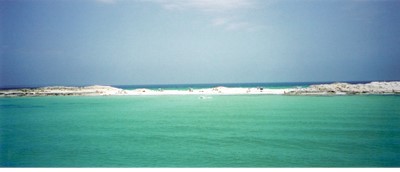
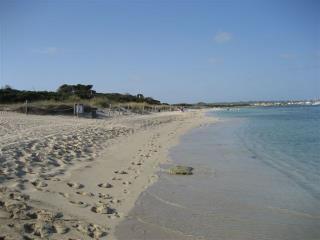
Ses Platgetes (Es Calo) This beach is close to the fishing village of Es Calo, in the south of the island, opposite Migjorn beach. Naturism is widely and enthusiastically practised here.
Es Cavall d’en Borras is the closest beach to the port and attracts day trippers. The northern end of the beach is favoured by naturists, beyond the El Tiburon beach restaurant. The beach is made of fine-grain white sand, with submerged rocks offshore providing very calm conditions.
Cala Saona is located on the western coast and is a horseshoe shaped bay, favoured by the boating set. The beach is overlooked by a small hostal and is predominately used by clothed beach-goers. However, it is a very pretty setting and worth a visit, especially by boat.
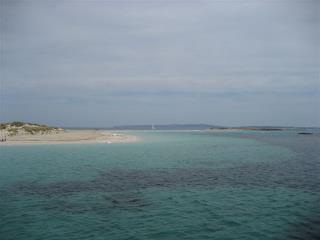 The Island of Espalmador lies to the north of Formentera. It is privately owned, but the beaches are open to the public. It is only accessible by boat, despite numerous references to wading across from Formentera at low tide. This is not recommended as very strong hazardous, undercurrents exist.A daily local ferry operates from La Savina to the island, with the last ferry returning around 5.30pm.Apart from escaping from the summer crowds, its other main attraction is its mud baths. People visit them for their alleged medical properties. Naturism is the norm on this island, though quite a few will be covered in mud!
The Island of Espalmador lies to the north of Formentera. It is privately owned, but the beaches are open to the public. It is only accessible by boat, despite numerous references to wading across from Formentera at low tide. This is not recommended as very strong hazardous, undercurrents exist.A daily local ferry operates from La Savina to the island, with the last ferry returning around 5.30pm.Apart from escaping from the summer crowds, its other main attraction is its mud baths. People visit them for their alleged medical properties. Naturism is the norm on this island, though quite a few will be covered in mud! 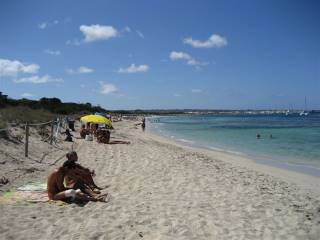
While the car and moped/scooter are the preferred mode of transport, I strongly recommend the use of bicycles. Not only is this a complete change to our use of cars at home, but also it introduces you to the slower pace of the island. The vast majority of the beaches are accessible by bike, but also incur no parking charges. (applicable for access to Illetes).
So why come to Formentera? You come to the island to relax, to seek seclusion, to escape the crowds. Literally you can come and shake off your clothes, to be at one with nature.
View more photographs of Formentera by Dave L.
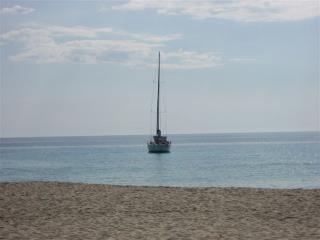
Δεν υπάρχουν σχόλια:
Δημοσίευση σχολίου